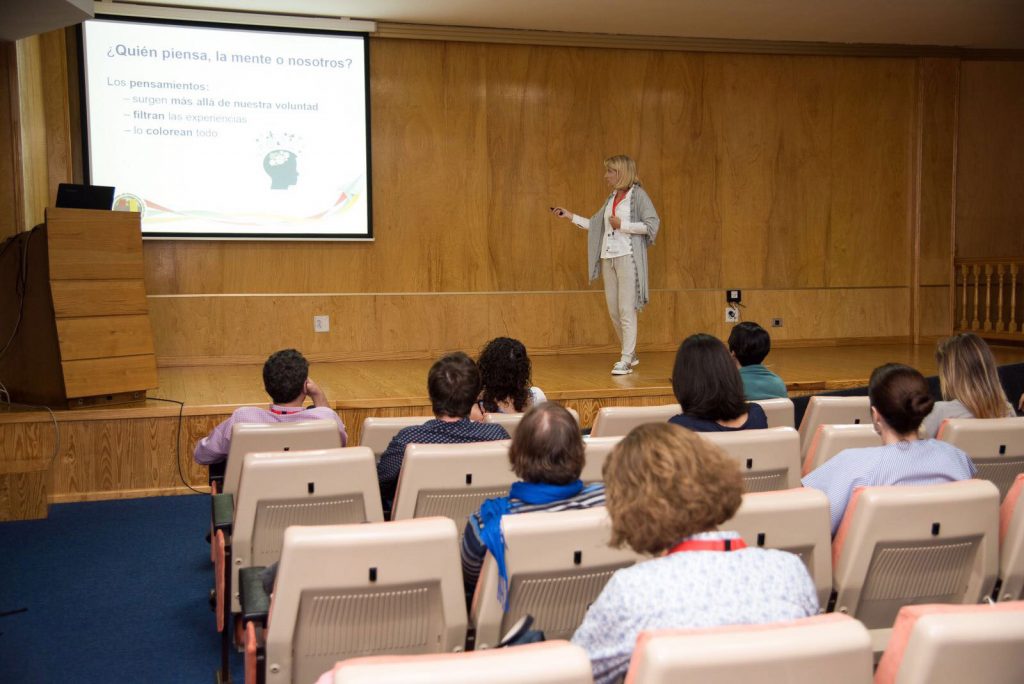Who is Helen Grain
Helen Grain is an expert in Mindfulness who offers different services:
Helen Grain is an expert in Mindfulness who offers different services:
Mindfulness is a simple and powerful practice which teaches you how to give your full attention to what is happening while it is happening, in a bid to better handle the pressures of everyday life.
Stress evolved as a survival mechanism enabling humans to react promptly to life-threatening situations. But beyond a certain point, when stress is activated by events which we simply don’t like, it stops being helpful and starts to damage our health.
Mindfulness has been shown to reduce this chronic activation of what is also known as the fight or flight response, thus regulating the activation of the amygdala, and changing the brain’s neural pathways. Mindfulness meditators become more resilient to stress and improve their psychological states.
We often leave our wellbeing for ‘some day’ in the belief that things will one day be better, and that somehow we’ll be more deserving. Automatic pilot is now running the show, and we are not aware of how harmful our habitual way of thinking and feeling can be.
By intentionally bringing our attention back to our immediate experience, Mindfulness helps us recognise automatic pilot, gives us the tools to be able to make wiser choices, and reduces our reactivity, thus promoting our wellbeing.
Living with pain and illness, especially when it is long-term, can have a devastating impact on our mental health and our general wellbeing. Pain is the body’s way of warning us something is not quite right, and it is difficult to ignore. It is often made worse by our natural instinct to avoid pain and our habit of dwelling on what we do not like.
Mindfulness-based Stress Reduction (MBSR) was originally conceived to help people living with chronic pain make wiser choices and relate to their pain differently. Mindfulness seems to allow pain sufferers to turn down the volume on pain signals.
We live in a world of distractions, yet being able to focus is essential. Research shows that almost half of our waking day, we are thinking about what is not happening. The more routine our activity, the more our minds wander. More often than not our thoughts are negative and repetitive.
There is strong evidence that a Mindfulness practice reduces mind-wandering because we learn to observe an object of attention, say our breath, and every time the mind wanders we intentionally return to the exercise at hand. The more you practice the easier it gets and the better you become at it.
Mindfulness combines the best of ancient wisdom and modern science into a set of simple practices that can be learn by anyone.
It is a simple practice because we learn to pay attention to, and become aware of, what is happening as it is happening. We do so by intentionally observing sensations, thoughts, and emotions as they arise moment by moment, and by not being harsh with ourselves when our mind wanders.
Mindfulness is an effective practice because it breaks the habit of getting lost in thought, which according to scientific research is how we spend almost half of our waking hours. With time this ‘being lost in thought’ generates additional stress to the already existing pressures of everyday life. Mindfulness helps us reduce this unnecessary stress.
Helen is a certified Mindfulness-based Stress Reduction (MBSR) teacher, Yoga instructor and traditional meditation teacher.
She has trained with several of the most renowned teachers worldwide, including Jon Kabat-Zinn, Saki Santorelli, Mark Williams, Alan Wallace, and in Spain Ramiro Calle.
Helen runs regular MBSR 8-week programmes, workshops and taster sessions. Her clients include private individuales, schools and multinational corporations, among others. She teaches in Spanish and English.
Helen’s first two books have been published in Spanish. In 2016, “Mindfulness, la magia del momento” and in 2018 “Beni y Bela meditan. Mindfulness for kids”.
Helen works with companies, business schools, off-site training concerns and individuals to bring Mindfulness into the workplace and their corporate culture. Her approach to teaching Mindfulness in these settings is greatly influenced by her own extensive corporate experience.
Contact HelenOne of the best ways to introduce Mindfulness into the workplace is via a live presentation on how to practice mindfulness, and why.
The session should be both informative and experiential, and would ideally include a few basic practices which the participants can then take home with them. These introductory workshops can be adapted both in format and duration, and can be used to gauge if there might be any further interest in organising a more complete training.
A presentation can last anywhere between 90 minutes and a whole day, and companies can choose whether to organise the training on or off-site.

The main business case for Mindfulness is that if you are fully present at work you will be less prone to distraction, more effective, and better at making decisions.
The question is how to embed Mindfulness in the workplace to significantly increase employee focus, performance, resilience and wellbeing. Helen’s courses and workshops teach executives and employees alike how to:
Begin your mindful journey with an immersive one-day workshop on the foundations of workplace mindfulness. Other options available.
Participants will learn the fundamentals including how to:

































